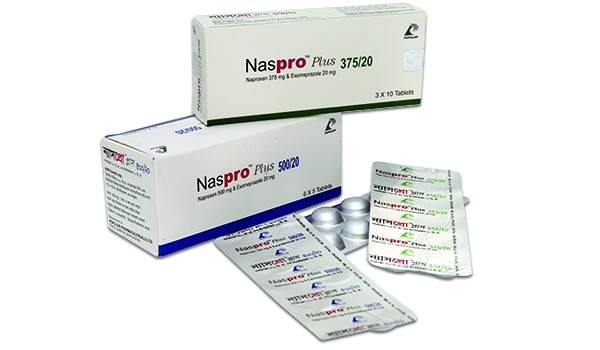ঔষধের বিস্তারিত বা বিকল্প ঔষধ জানতে ঔষধের নাম দিয়ে সার্চ দিন। যেমন- Napa বা Alatrol বা Amodis
Naspro Plus 375mg+20mg
TabletNaproxen Sodium + Esomeprazole
Popular Pharmaceuticals Ltd
Other Strength:
- Naspro 250mg
- Naspro Plus 500mg+20mg
Alternative:
- Progesic 375mg+20mg
- Xenole 375mg+20mg
- Solivo 375mg+20mg
- Anaflex Max 375mg+20mg
- Napxon 375mg+20mg
- Napexa 375mg+20mg
- Neso 375mg+20mg
- Napro-A Plus 375mg+20mg

Naspro Plus
Indication
Naspro Plus is indicated for the relief of signs and symptoms of osteoarthritis, rheumatoid arthritis, and ankylosing spondylitis and to decrease the risk of developing gastric ulcers in patients at risk of developing NSAID-associated gastric ulcers. Naspro Plus is not recommended for initial treatment of acute pain because the absorption of naproxen is delayed compared to absorption from other naproxen-containing products. Controlled studies do not extend beyond 6 months.
Dosage & Administration
Rheumatoid Arthritis, Osteoarthritis and Ankylosing Spondylitis: The dosage is one tablet twice daily of Naspro Plus 375/20 or Naspro Plus 500/20 tablet. The tablets are to be swallowed whole with liquid. Do not split, chew, crush or dissolve the tablet. Naspro Plus is to be taken at least 30 minutes before meals.
Geriatric Patients: Studies indicate that although total plasma concentration of naproxen is unchanged, the unbound plasma fraction of naproxen is increased in the elderly. Use caution when high doses are required and some adjustment of dosage may be required in elderly patients.
Patients with Moderate to Severe Renal Impairment: Naproxen-containing products are not recommended for use in patients with moderate to severe or severe renal impairment (creatinine clearance < 30 ml/min).
Hepatic Insufficiency: Monitor patients with mild to moderate hepatic impairment closely and consider a possible dose reduction based on the naproxen component of Naspro Plus. Naspro Plus is not recommended in patients with severe hepatic impairment because esomeprazole doses should not exceed 20 mg daily in these patients.
Pediatric Patients: The safety and efficacy of Naspro Plus in children younger than 18 years have not been established. Naspro Plus is therefore not recommended for use in children.
Precautions
Cardiovascular Thrombotic Events: clinical trials of several COX-2 selective and nonselective NSAIDS of up to three years duration have shown an increased risk of serious cardiovascular (CV) thrombotic events, myocardial infarction, and stroke, which can be fatal. Hypertension: NSAIDS, including naproxen, a component of Naspro Plus, can lead to onset of new hypertension or worsening of preexisting hypertension, either of which may contribute to the increased incidence of CV events. Congestive Heart Failure and Edema: Fluid retention, edema, and peripheral edema have been observed in some patients taking NSAIDs and should be used with caution in patients with fluid retention or heart failure. Gastrointestinal Effects - Risk of Ulceration, Bleeding, and
Perforation: NSAIDs, including naproxen, a component of Naspro Plus, can cause serious gastrointestinal (GI) adverse events including inflammation, bleeding, ulceration, and perforation of the stomach, small intestine, or large intestine, which can be fatal. While naproxen and esomeprazole combination has been shown to significantly decrease the occurrence of gastric ulcers compared to naproxen alone, ulceration and associated complications can still occur. Renal Effects: Long-term administration of NSAIDs has resulted in renal papillary necrosis and other renal injury. Pregnancy - Pregnancy Category C: In late pregnancy, as with other NSAIDs, naproxen, a component of Naspro Plus, should be avoided because it may cause premature closure of the ductus arteriosus.
এই পাতাটি ২৩২ বার দেখা হয়েছে
রাজডক কী?
ফ্রী সদস্য হোন Click Here
ডাক্তার হিসাবে যোগদান করতে Click Here
নার্স / টেকনোলজিস্ট হিসাবে যোগদান করতে Click Here
ফ্রী সদস্য হোন Click Here
ডাক্তার হিসাবে যোগদান করতে Click Here
নার্স / টেকনোলজিস্ট হিসাবে যোগদান করতে Click Here

